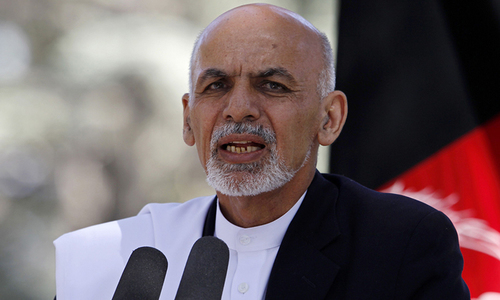ISLAMABAD: Russia, China and Pakistan on Tuesday agreed to expand their tripartite consultations on Afghan conflict and include other countries, including Afghanistan, after Kabul objected to its absence from the regional discussions.
“The parties agreed to proceed with consultations in an expanded format and would welcome the participation of Afghanistan,” a joint statement issued after a meeting of the senior officials of the three countries said.
It was the third round of talks between the three countries on “deteriorating situation in Afghanistan”, particularly the rise of the militant Islamic State (IS) group also known by its Arabic acronym Daesh.
Kabul objects to exclusion from tripartite meeting
The previous two rounds of the tripartite meetings were not publicly disclosed. The third meeting was announced by the participating states in an indication of their growing confidence in their cooperation driven by the fear of IS gaining a foothold in Afghanistan. The announcement of the talks, however, annoyed Kabul, which questioned the effectiveness of a process on Afghanistan without its representation.
Also read: Pakistan, China, Russia warn of increased IS threat in Afghanistan
A spokesman for the Afghan Foreign Ministry, Ahmad Shekib Mostaghni, while speaking to media in Kabul cautioned that no initiative relating to Afghanistan could succeed without its involvement. “Even if such talks are organised with goodwill, [they] cannot yield any substantial results because no one from the Afghan side is there,” he said in a diplomatically couched criticism of the trilateral meeting.
The meeting had provoked a storm of protest from Afghan leaders, who saw it as “meddling in Afghanistan’s internal affairs”, “illegitimate” and “dubious”. Speaker of the lower house of Afghan parliament Abdul Rauf Ibrahimi had asked the government to seek a clarification from Moscow about the meeting.
Meanwhile, Russia is also supporting Iran’s entry into the relatively new process. Tehran has been Moscow’s ally in the fight against IS in Syria. In a separate troika formed last week, Russia, Iran and Turkey reaffirmed “their determination to jointly fight the IS”.
Washington had felt upset over not being included in that anti-IS bloc and is now uncomfortable over being left out from the three-way deliberations on the situation in Afghanistan.
The tripartite meeting on Tuesday expressed concerns over the increased activity of IS in Afghanistan.
Examine: Our Afghan problem
Russians believe that protracted conflict in Afghanistan has left ungoverned spaces there, which are being taken up by the IS fighters returning from Iraq and Syria, where the militant group is on the retreat.
According to the Voice of America, Russia’s ambassador to the United Nations, Vitaly Churkin, told the UN Security Council last week that the deteriorating security situation in the country had encouraged the IS militants fleeing Syria and Iraq to look to Afghanistan for shelter. He said they would eventually pose a threat to Russia through neighbouring central Asian states.
FO spokesman Nafees Zakaria, while sharing Pakistan’s position at a recent media briefing, said: “Afghanistan is infested with most terrorist organisations due to the instability there, which has created space for these terrorist elements. These are the facts which are known to all.”
Peace talks
The three countries reiterated their support for reconciliation process in Afghanistan. “The participants agreed to continue their efforts towards further facilitating the Afghan-led, Afghan-owned peace and reconciliation process in Afghanistan according to the known principles of reintegration of the armed opposition into peaceful life,” the joint statement said.
“The Russian Federation and the People’s Republic of China as the UN Security Council permanent members confirmed their flexible approach to delisting Afghan individuals from the UN sanctions lists as their contribution to the efforts aimed at launching peaceful dialogue between Kabul and the Taliban,” the statement further noted.
The position on delisting looked to be a snub for Kabul that had last month asked the United Nations to add Taliban’s new leader, Maulvi Haibatullah, to its sanctions list.
Published in Dawn, December 28th, 2016














































